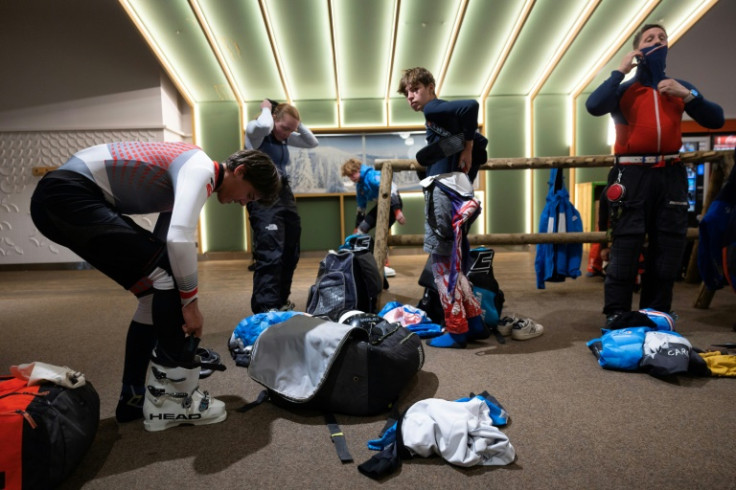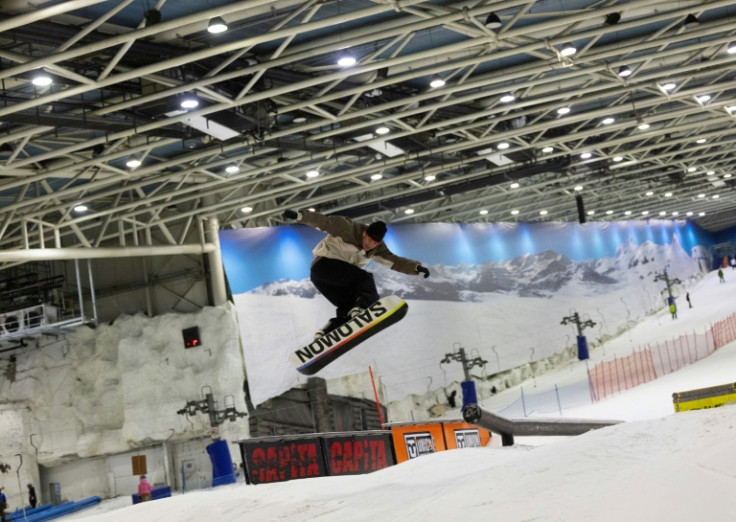Skiing In A Madrid Shopping Centre When It's 34C Outside

They take off their flip flops and put on ski suits and gloves. Outside this Madrid mall, it's scorching, but at Snozone, customers are happy to ignore the summer heat -- and environmental issues.
An icy breeze in the lobby and a polar bear at the entrance plunge these summer visitors into another world at the Xanadu shopping centre 20 kilometres (12 miles) south of Madrid.
Opened in 2003, Snozone has a 250-metre long ski slope covered in artificial snow, open 365 days a year.
Outside it is 34 degrees Celsius (93 degrees Fahrenheit), but inside it is -3C (26F), and between a chairlift and a ski drag, about 30 skiers race down the slope watched by spectators.
Two hours of skiing costs about 40 euros ($44).
Members of the Carcassonne ski club in southern France have been coming here for seven years, says Thomas Barataud, an instructor at Les Angles ski resort in the eastern Pyrenees.
"We used to ski on the glaciers (in summer), but the climate has complicated that. Here you've got hard snow and cold weather, so the kids can keep skiing, which is good," he said.
About 10 students who compete in skiing events are spending a week here doing slaloms on the section reserved for clubs, which has a hard and more technical surface.
"It's not very environmentally friendly," admits Barataud, 43. "But it's what we're looking for. We make do with what we have and this is a good alternative.
"When we leave at 4:00 pm, it's a bit weird, because we are wearing shorts and flip flops," he chuckles.
Student Cyrila Pena talks about the "heat shock when the sun beats down on you".
The 18-year-old says being here is "fantastic", but adds that some of her friends are surprised, asking her: "Aren't you embarrassed to be skiing indoors?"
"If older generations had looked after the environment, we could have skied on the glaciers," she retorts.
"But we have to ski indoors, because if we wait until December (to practice), it's too late."
Every year, 200,000 people come here -- on a good day, they can have 1,800 customers.
Peak season at Snozone is from October to March, says director Javier Villar.
"Those that come are beginners who go over what they know, or competitive teams from France, England, Spain and Andorra who come to train because there's no snow in the mountains."
He insists water consumption is much lower than at a gym, but the biggest cost is electricity at the 18,000-square-metre venue, the equivalent of 4.5 acres.
"It's a fridge. If we had to turn it off and back on again, the electricity cost would be huge, that's why we're open all year round," said Villar, 55.
The company bought solar panels, which was "very profitable, not only in terms of our carbon footprint, but also economically."
Snozone, which belongs to Capital & Regional, a British retail property trust, also owns two indoor ski slopes in the UK: in Milton Keynes, just north of London, and Castleford, near the northern city of Leeds.
The world's biggest indoor ski slope is Ski Dubai, in the United Arab Emirates.
On the ramp, snowboarder Izan Romano tries a trick. This 20-year-old bricklayer has a 600-euro annual pass and comes four or five times a week.
"Summer, winter, it's all the same -- there is always snow. It is my escape, I forget what is outside," said Romano, who lives in Madrid.
"I came today because I was dying of heat at home. Some go to the pool, I take the car and drive to the snow."
And what about the environment?
"What are you talking about? It doesn't bear thinking about."


© Copyright AFP 2024. All rights reserved.





















